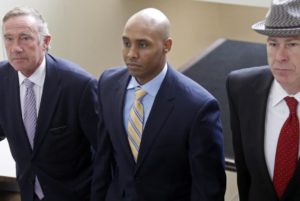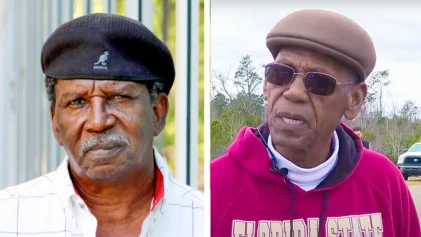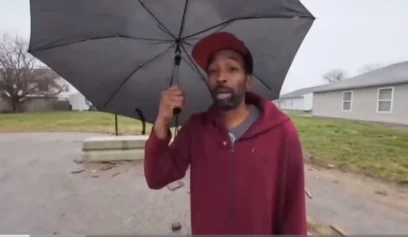
FILE – In this May 8, 2018, file photo, Mohamed Noor, center, accompanied by his legal team, Peter Wold, left, and Tom Plunkett, right, arrives at the Hennepin County Government Center for a hearing in Minneapolis. (AP Photo/Jim Mone, File)
MINNEAPOLIS (AP) — Attorneys head to court Thursday to argue over whether a criminal case should go forward against a former Minneapolis police officer who fatally shot an unarmed Australian woman who had called 911 to report a possible sexual assault in the alley behind her home.
Mohamed Noor’s attorneys maintain he acted reasonably July 15, 2017, when he shot Justine Ruszczyk Damond. They’ve asked the judge to dismiss the charges. But prosecutors say Noor acted recklessly in using deadly force against Damond, a 40-year-old life coach and dual citizen who was engaged to be married.
Here’s a look at the issues in play in a case that has drawn international attention:
THE HEARING
The hearing is mostly about whether the case can proceed to trial. Defense attorneys are asking that the charges be dismissed for a lack of probable cause. They argue Noor fired in reaction to a perceived threat of danger, not with a “depraved mind, regardless of human life” as required under Minnesota’s definition of third-degree murder. They also say he didn’t act with the “culpable negligence” needed for a conviction for second-degree manslaughter.
The defense also wants the charges thrown out because of public statements by Hennepin County Attorney Mike Freeman that they claim undermine his right to a fair trial. And they’ve asked the judge to suppress psychological records, saying the search warrants used to obtain them violated his right to confidentiality.
Hennepin County District Judge Kathryn Quaintance is expected to let the case proceed, although it’s not clear if she’ll rule Thursday or later. It will also be up to her whether to take Noor’s not-guilty plea Thursday or at another hearing. He remains free on bail.
THE SHOOTING
Noor, who has declined to speak with investigators, was in the passenger seat of a squad SUV when he reached across his partner and fired at Damond through the driver’s window after she walked up to them while they were stopped in her alley.
His partner, Matthew Harrity, told investigators they “got spooked” when she approached. Harrity said he heard a voice and a thump on the back of the squad, and glimpsed a head and shoulders outside. Harrity said he feared for his life and drew his gun, holding it by his ribcage pointed downward. Noor, however, fired at Damond, striking her abdomen. She died at the scene.
THE PSYCHOLOGICAL RECORDS
Prosecutors say Noor’s psychological records were properly obtained with valid search warrants, and no physician-patient privilege bars their admissibility.
The records clearly would be useful to prosecutors at trial. According to court filings, training officers expressed concerns about Noor’s fitness for duty long before the shooting. They said officers who trained him said he had problems handling job stress and engaging with people.
A psychological evaluation found that Noor was more likely than other officer candidates to become impatient with others over minor infractions, have trouble getting along with others, to be more demanding and to have a limited social support network. Nevertheless, he was deemed fit to work as a cadet officer.
Noor’s attorneys, Thomas Plunkett and Peter Wold, countered that prosecutors were trying to mislead the court about his past conduct. They wrote that that training officers never found Noor to be “unacceptable” at a task, and that the psychological test he took was racially biased. Noor is Somali-American.
His lawyers said the psychologist who administered the test and the psychiatrist who cleared Noor for duty told prosecutor Amy Sweasy that Noor’s results were likely a result of his race and culture, not a personality disorder.
THE FAMILY’S LAWSUIT
Damond’s father, John Ruszczyk, has filed a $50 million civil rights lawsuit against Noor, the city and others. It accuses the officers of conspiring to cover up facts surrounding the shooting and of deliberately not activating their body cameras until afterward.
A federal judge is deciding whether to put the lawsuit on hold while the criminal case is pending.
Noor’s attorneys say the lawsuit should be delayed so Noor can fairly defend himself in both trials. Prosecutors support pausing the civil case to avoid prejudicing the jury pool. But Damond’s family says they deserve answers.


